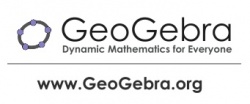ORBIT/GeoGebra: Difference between revisions
| Line 2: | Line 2: | ||
=ORBIT/GeoGebra Competition= | =ORBIT/GeoGebra Competition= | ||
[[image:geogebralogo.jpg|250px]] '''Submit your primary mathematics activity for a chance to win University of Cambridge prizes & certificates and have your activity posted on a high profile educational website!''' | [[image:geogebralogo.jpg|250px]] <br /> | ||
<br /> | |||
'''Submit your primary mathematics activity for a chance to win University of Cambridge prizes & certificates and have your activity posted on a high profile educational website!''' | |||
'''''Members of the GeoGebra community will vote for the top 25 activities, and experts in primary maths will designate the three winners.''''' | '''''Members of the GeoGebra community will vote for the top 25 activities, and experts in primary maths will designate the three winners.''''' | ||
Revision as of 10:08, 14 November 2012
ORBIT/GeoGebra Competition

Submit your primary mathematics activity for a chance to win University of Cambridge prizes & certificates and have your activity posted on a high profile educational website!
Members of the GeoGebra community will vote for the top 25 activities, and experts in primary maths will designate the three winners.
What is ORBIT?
ORBIT is a new resource bank (http://orbit.educ.cam.ac.uk/wiki/ORBIT) with a focus on interactive teaching in mathematics and science across the primary / secondary sectors, enhanced by using ICT. It is designed for a wide audience of teachers and teacher educators interested in using and sharing Open Educational Resources (OER).
We have found it difficult to source high quality GeoGebra resources for primary children, hence this competition!
The three winners of the ORBIT/GeoGebra competition (and probably some of those on the shortlist) will have their activities posted on the ORBIT wiki alongside teachers from prominent teacher education institutions.
Competition Instructions
The activity must be open-ended to some degree, supporting interactive teaching and active learning. We are looking for investigations that allow children to explore an element of mathematics for themselves. These might be challenging or thought-provoking; they certainly need to be engaging and productive for learning (any standard curriculum topic).
Submitted GeoGebra files and instructions must:
- be no longer than 500 words,
- be aimed at primary (age 5-12) students and specify which age (e.g. 7-9 years old) it is suited for,
- have been tried and tested in class,
- include a short overview,
- list the learning objectives as bullet points,
- include a short (3-4 sentences) description of the underlying pedagogical/teaching approach or rationale,
- contain a short compulsory teacher’s note (max 250 words) which provide instructions, useful tips and recommendations (submissions without teachers’ notes will not be reviewed).
For an example of the kind of pedagogical approach and teacher’s notes required, please see the ORBIT resource entitled Consecutive Sums at http://orbit.educ.cam.ac.uk/wiki/Consecutive_sums/Consecutive_sums_activity. Please note that your notes need not be as long as those, however.
We’re not expecting whole lesson plans but rather a clear and concise presentation of how to use the activity effectively in class, especially for a teacher not very familiar with the software, where step-by-step instructions regarding navigating the software will be needed.
Submission Procedures
- Upload your file and notes on GeoGebratube.org with the TAG: ORBITCOMP using either your GeoGebratube, Facebook or Google password.
- Copy the link of your GeoGebratube file and fill this form.
(see step-by-step instructions)
Prizes
- A University of Cambridge tee-shirt, mug and bag for the winner + a University of Cambridge/GeoGebra Certificate
- A University of Cambridge tee-shirt and bag for finalist number two + a University of Cambridge/GeoGebra Certificate
- A University of Cambridge tee-shirt and mug for finalist number three + a University of Cambridge/GeoGebra Certificate
Fame – or at least public acknowledgement! – through inclusion in the ORBIT resource bank. This offers the opportunity to have your name associated with a high profile, innovative University of Cambridge project.
The creators of the top 25 resources will receive a University of Cambridge/GeoGebra Certificate
Deadline
Files should be submitted by...
